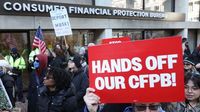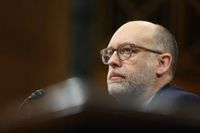A federal judge in Washington, D.C., has ordered an immediate halt to the planned firings of nearly 1,500 employees at the Consumer Financial Protection Bureau (CFPB). This decision comes as a response to concerns that the Trump administration may have violated court orders regarding the agency's staffing reductions.
District Judge Amy Berman Jackson expressed her "deep concern" during a hearing held on April 18, 2025, about the rushed efforts to implement a Reduction In Force (RIF) affecting approximately 1,483 employees, which was set to take effect at 6 p.m. that day. Jackson stated, "There is reason to believe that the defendants simply spent the days immediately following the Circuit’s relaxation of the Order dressing their RIF in new clothes, and that they are thumbing their nose at both this Court and the Court of Appeals." This remark highlights the tension between the executive and judicial branches, particularly as the Trump administration has faced multiple legal challenges regarding its policies.
The judge's ruling paused the mass layoffs and scheduled a hearing for April 28, 2025, where top officials from the CFPB, including Mark Paoletta, the agency's chief legal officer, and Gavin Kliger, a member of Elon Musk's Department of Government Efficiency (DOGE), will be required to testify under oath. Jackson ordered the government to provide any communications related to the layoffs to ensure transparency and compliance with her previous orders.
The Trump administration's plan to reduce the CFPB's workforce has drawn criticism from various quarters, including employee unions and consumer advocates. According to a sworn declaration from Paoletta, the administration intended to operate the agency with a drastically reduced staff of 206 employees. This reduction would leave the CFPB with a workforce that is nearly 90% smaller than its previous headcount of approximately 1,680 employees.
The CFPB was established in the wake of the 2008 financial crisis to protect consumers from unfair business practices. It has the authority to issue regulations and enforce compliance across a range of financial services, including mortgages, credit cards, and student loans. Since its inception in 2011, the CFPB has recovered over $20.7 billion for American consumers, making it a significant player in safeguarding consumer rights.
Critics of the CFPB, including President Trump and Musk, have argued that the agency has overstepped its legal bounds and should be dismantled. Trump has previously stated that the CFPB is "very important to get rid of" and that it was "set up to destroy some very good people." This sentiment reflects a broader Republican effort to reduce the size and scope of federal agencies that they believe are overly intrusive.
In her ruling, Judge Jackson emphasized the potential consequences of the layoffs, stating that if the plan were allowed to proceed, the CFPB would be rendered unable to fulfill its statutory duties. She noted that the layoffs could lead to a significant erosion of the agency's ability to protect consumers, particularly as it prepares to handle millions of complaints in the coming year.
During the hearing, employees expressed their distress over the impending layoffs. Many had received notices that their employment would be terminated, with some breaking into tears in court. One employee, identified only as Alex Doe, reported that Kliger had kept staff working for 36 hours straight to ensure that layoff notices were sent out on time, creating a chaotic and stressful environment.
Jackson's order follows a preliminary injunction she issued on March 28, 2025, which halted any mass reductions in force at the CFPB. An appeals court later ruled that while the agency could send RIF notices, it could only do so after conducting individualized assessments of employees to determine their necessity for the agency's operations.
The layoffs were set to impact critical divisions within the CFPB, including the enforcement division, which was slated to be cut from 248 employees to just 50, and the supervision division, which would shrink from 487 to 50. These cuts would significantly impair the agency's ability to oversee compliance with consumer protection laws.
In response to the judge's ruling, the National Treasury Employees Union (NTEU) expressed relief but emphasized the need for ongoing vigilance regarding the administration's actions. The union has been actively challenging the layoffs and advocating for the preservation of the CFPB's workforce and mission.
As the situation unfolds, the upcoming hearing on April 28 will be critical in determining the future of the CFPB and its employees. Judge Jackson's decision to pause the layoffs reflects a commitment to uphold the rule of law and protect the rights of workers in the face of aggressive administrative actions.
The outcome of this case could set a significant precedent for how federal agencies operate in the future, particularly in terms of compliance with legal mandates and the treatment of their employees. With the CFPB's mission at stake, the implications of this ruling extend far beyond the agency itself, touching on broader issues of government accountability and consumer protection.










